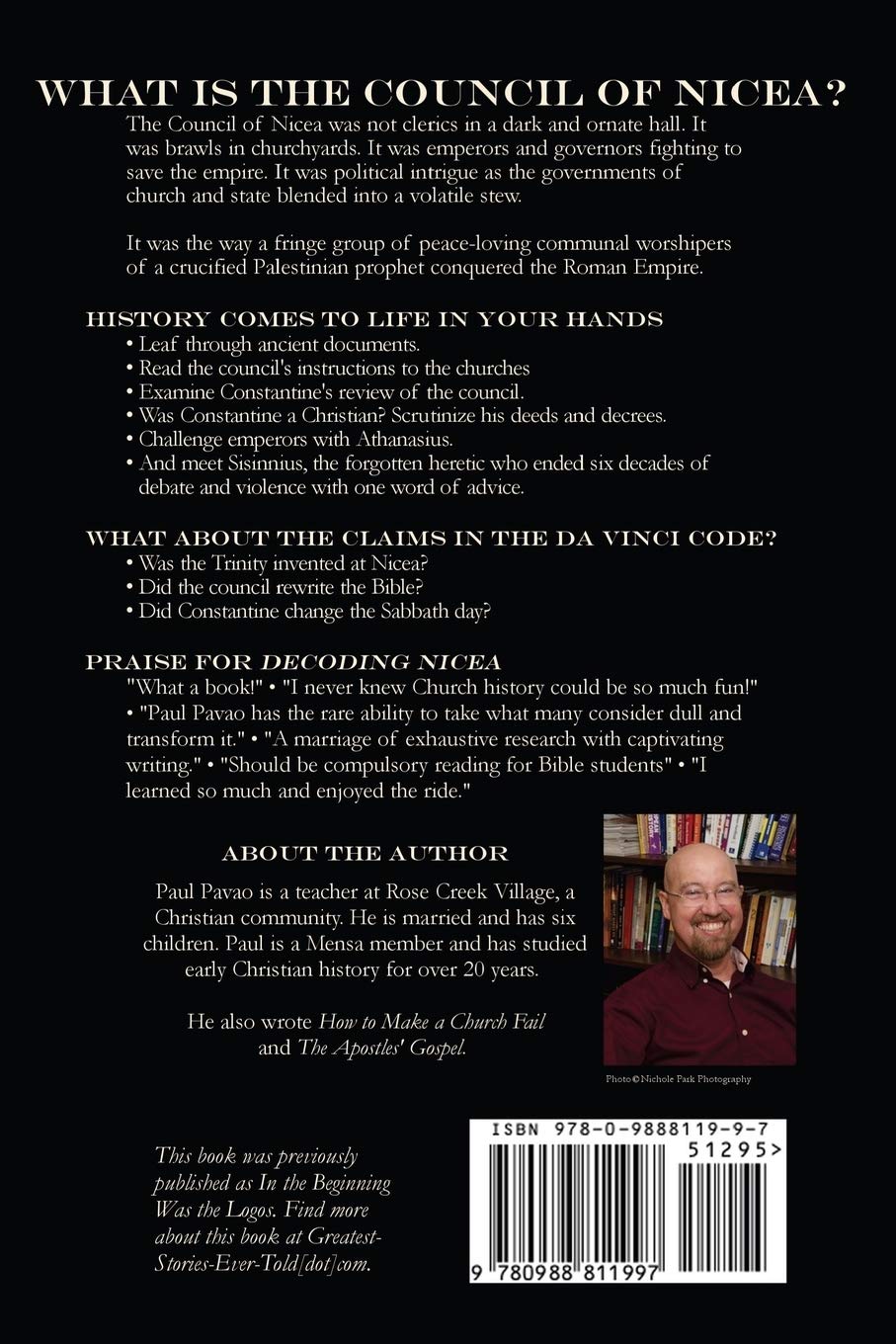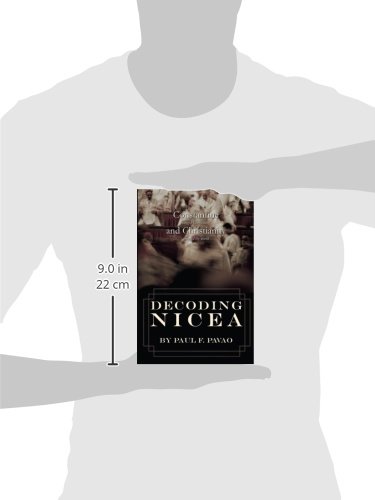Customer Services
Copyright © 2025 Desertcart Holdings Limited
Desert Online General Trading LLC
Dubai, United Arab Emirates




Decoding Nicea: Constantine Changed Christianity and Christianity Changed the World
D**.
A Great, Fascinating Book About Early Christianity and a Bargain
I own over 50 books about Jesus and early Christianity, including several about the First Council of Nicea, and this is the best one I’ve ever read. I feel lucky to have found it and it is a bargain. I bought the paperback, which is 460 pages long, and I was worried that the print might be small, but it isn’t – the print is the size you find in a nice hardback book and easy to read.This book contains much more than the Council of Nicea – it could almost be titled “The Teachings of the Apostles and a History of Early Christianity Through the First Council of Nicea”, because to understand the Council of Nicea, you have to have some “backstory”. If you love to read about early Christianity and seek the historic truth, you will love this book. The author doesn’t “preach” or try to persuade you of a particular viewpoint – it is more like scholarly research that includes many excerpts (over 100) from writings by Constantine the Great, historians, and the earliest Christian writers such as Clement of Rome, Ignatius, Polycarp, Justin Martyr, Athenagoras, Theophilus, Irenaeus, Clement of Alexandria, Tertullian, Hippolytus, Origen, Cyprian, Athanasius, Eusebius of Caesarea, Theodoret, Sozomen, and Socrates Scholasticus. It is amazing that so many early writings still exist. You could spend hundreds of hours tracking down these ancient texts and sorting thru them. The author seems to believe the facts speak for themselves and he doesn’t try to manipulate the facts to steer a conclusion. Sometimes he tells you what he thinks, but I never felt that he was trying to manipulate me or preach to me.A few examples of what is in this book (if I get some things wrong, blame me, not the author – I’m not an expert and some of this is complicated) –1. By providing excerpts from many early writings, the author convinced me that the relationship of God and Jesus as expressed in the Nicene Creed was believed by many Christians for 100 or more years before the First Council of Nicea. (Those ideas didn’t originate at the Council).2. Was the Roman Catholic Church founded by the Council of Nicea? It is well-explained that the answer is “No”.3. You can read excerpts from the earliest Christian writings and get an idea of what was taught at the earliest Christian churches that were founded by the Apostles.4. The 20 Canons (rules) that were issued by the Council are published in the book. I have never seen them anywhere else. It is educational to read them – they gave me an idea of some of the controversies the Council was dealing with. For example, Canon 1 says that if someone has castrated himself, he should not be an elder or bishop. However, if a man was castrated by barbarians or by his master (I assume as a slave), he could be an elder or bishop. Why were men castrating themselves? The author explains why.5. The “Arian Controversy” which was a HUGE argument that started around AD 320, and was the main reason the First Council of Nicea was called. In brief, the argument was over what the Son of God was made of, and is Jesus "eternal" or "created"? More simply stated, “whether Jesus was God.” The arguments are complicated but fascinating. Over 100 pages are devoted to this.6. Where does Constantine the Great fit into all this? The author explains. I have spent some time studying Constantine and think Constantine is presented honestly.7. Did you know that early Christians were pacifists who refused to serve in the army?Let me repeat that this review may contain errors, but they aren’t intentional, and I may have misstated what the author intended to say. Some of the topics are very complicated and I’m not an expert. I think anyone interested in early Christianity or the First Council of Nicea would really enjoy this book and I think it is a bargain.
A**R
Beyond what I expected
I read this years ago and reread it now because I forgot what it was about. It's far more than just about Nicea. It's packed with very well supported insights about early church (and beyond) history and some deep dive theology and real practical Christianity. Very fascinating and informative. Amazing book.
C**R
Well-Documented
This is a thought-provoking book, even for a layperson. I honestly don’t know how I ended up with this book, because it seems more in line with something someone concerned with church doctrine (not my area of expertise or primary interest) would read. All beliefs espoused and supported in this book revolve around the unity of the church, regardless of “denomination,” and the following of what the apostles taught and handed down to the church. The other main focus seems to be the position of Jesus Christ in relation to God—when He was begotten and His positioning in relation to God. Pavao documents his sources extensively and gives many examples to back up his statements. He is also transparent in what his beliefs are.
V**R
Really interesting!
This guy has done great work in researching the writings on this topic! He admits that he is not a language scholar, but rather someone who gathers information from other english sources. He tends to quote the translator or the scholar and then follows with his own observations or commentary. I found this to be engaging and easy to read. This could have something to do with my extreme interest in the subject but I suspect that I would feel he did a great job even if I were not. His bibliography is enormous!
A**Y
Very well researched the author uses primary sources and scholars
The author of the book renamed his book "Decoding Nicea" and I could not agree even more. Have you ever wondered what really happened at Nicea? Have you ever heard things like the Council of Nicea created, the Trinity, the divinity Christ, the Sunday sabbath? How about things like the Council of Nicea chose what books should be in our bible? What is the truth? Should we not question this information and find the truth?We should and "Decoding Nicea" has.The author Paul Pavao has a way with words to clearly convey the original thoughts in today's language. He at the same time dispels the mystery and myths surrounding Nicea. In "Decoding Nicea" we read:"If you're one of those who prefer facts to rumors, I will put the history in your hands."The author uses scholars and primary sources while doing his best to minimize his own opinions in his well-researched book.I would highly recommend all Christian's to read this book.
A**N
some good information.
Not as scholarly as I had hoped. Still, some good information.
T**E
Read This Book!
I'm basically copying my review from the original publication of this book under another title. I think this book should be required reading for every Christian! This book is just amazing. It will give you a wonderful understanding of the Trinity and other important biblical issues. The author does a great job of explaining the beliefs of the early Christian leaders, and he backs up his assertions with many, many quotes directly from those leaders. Decoding Nicea will answer all your questions about the Council of Nicea, even including every canon that came out of it, along with explanations of them.This is one of those books that you will want to read over and over and give to friends who have even the slightest interest in early Christian history. I already ordered two more as gifts for my sisters. If you love this book as much as I did, you'll find a lot more to learn from the author on his website and blog. I also recommend his book, The Apostles' Gospel, the surprising teaching of which he very briefly mentions near the end of Decoding Nicea.
G**G
Very informative and engaging.
A very well written, engaging presentation of what the Council of Nicea was actually about (and what it -wasn't- about...). Anyone with an interest in history or theology needs to read this book.
Trustpilot
1 month ago
2 weeks ago